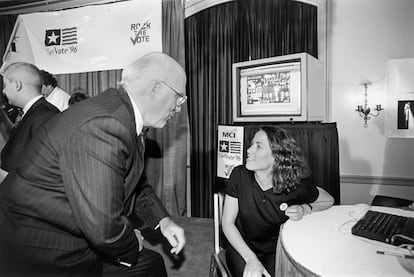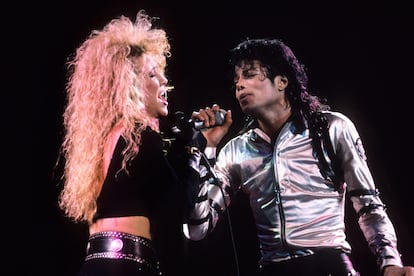A summer storm was on the verge of cancelling the concert. It ended up leaving a magnificent backdrop, a dark and worn blue sky, for Sheryl Crow’s first performance in Madrid in many years, which took place on Tuesday night at the Noches del Botánico. They were the right colours to cover a career full of songs about heartbreak and depression, however much her high and crystalline voice insists on deceiving us. “We are going to go back to the beginning,” she promised at the beginning. And that was what the concert consisted of: nothing sounded better than her first songs, like Run Baby Run, Leaving Las Vegas o Strong Enough, with whom she seemed more connected than with everyone else. She fired them one after the other, without pauses or unnecessary chatter, with the virtues and defects of any perfectionist: impeccable execution, on the one hand; and a technical requirement that, at times, brought it closer to bureaucratic coldness, on the other. It was almost perfect, except that it lacked tearing.
Even so, their songs have aged like leather, just like their performer, with a natural wear and tear that does not make them lose sophistication or character. Dressed in strict black, with a Bob Marley t-shirt and short platinum hair, the 62-year-old singer came out on stage with all the necessary rock epic, over some chords of Start Me Up of the Rolling Stones, but also with that friendliness of the good girl from the Midwest that she never stopped being, although one can sense hardness and loneliness beneath her indelible smile. Her songs talk about characters who look like her, about women who get drunk during the day in bars in Santa Monica and then wake up in other people’s beds with a crazy hangover, strong but not always free, or free but not always strong. Crow mixes social commentary and modest introspection. She likes rhythmic recitations, political opinions compatible with a 90s Democratic convention, and subtexts framed in feminism. soft. An aesthetic that made more sense three decades ago than now, although the Madrid public, who was dangerously close to the same age, did not take it into account.
In reality, Crow’s story is a tale from the last century, when sudden fame could only be a stroke of luck. Without social media or other means of self-promotion, in an industry governed by endless intermediaries, one could only rely on one’s talent and one’s destiny. A few years before her debut with Tuesday Night Music Club, which recently celebrated its 30th anniversary, Crow was still working as an elementary school teacher in her native Missouri. Her decisive moment came when recording a jingle advertising for McDonald’s. From there, everything followed the natural course: she moved to Los Angeles, she worked as a waitress in a joint—almost a legal obligation—she distributed her demos by all the record companies in the city and she showed up to an audition to which no one had invited her to be a backup singer for Michael Jackson on the tour of Badin the final stretch of the amoral eighties.
Against the odds, they hired her. For two years, she shared the stage with the King of Pop singing a duet I Just Can’t Stop Loving You all over the world. The tabloids paired them, although she was more concerned about the children who surrounded the singer, as she recounts in the recent documentary Sheryl, where he reviews a career in which misfortunes have abounded. She was sexually harassed by Jackson’s manager, Frank DiLeo, who had promised to make her a star. Pressured by her surroundings, she did not report him. It was the beginning of several depressive episodes that she has reflected in her songs, which are documents about her worst times, but also antidotes in the key of americana without excessive roughness. In his music we sense his insides, but they are almost never seen.
Her themes talk about characters who look like her, about women who get drunk during the day and wake up in other people’s beds with a crazy hangover, strong but not always free, or free but not always strong.
Tuesday Night Music Club It was released in 1993. It exploded on the radio stations thanks to All I Wanna Doa stainless song that she hated for a long time, although in Madrid it seemed to us that she had made peace with it, or maybe it was just the electrifying presence of a guest like the young man bluesman Jack Broadbent, their supposed opening act, who had to cancel his concert due to the storm. With that first album, Crow sold millions of copies, won his first three Grammys (out of a total of nine) and achieved overwhelming fame. In reality, Crow was just the visible head of a group of musicians who met in writing sessions on Tuesday nights, from which that first album emerged, one of the most successful debuts in history. Her second album was a declaration of intentions: surrounded by men who considered that she tended to take too many merits and that she would be nothing without them, she separated herself from that environment and decided to produce, write and perform various instruments in her revalidation, which she titled with her own name and which included hits like If It Makes You Happy o Everyday is a Winding Road, two high points of the Madrid concert.
The inevitable decline came after a huge album like The Globe Sessions: There is what is perhaps his best song, My Favorite Mistake, which in Madrid sounded somewhat soulless and accompanied by horrible synthetic images of satin sheets on the side screens. She then approached the lightness of Soak Up the Sun y Steve McQueenephemeral soundtracks in post-9/11 America, and a Cat Stevens cover, The First Cut is The Deepest, his greatest success in the last 20 years, acclaimed by the public at the Botánico, although it was more beautiful than penetrating. In 2006, after her breakup with cyclist Lance Armstrong and a diagnosis of breast cancer, Crow moved to Nashville and adopted her sons Wyatt and Levi. In 2019 she signed Threads, an album of collaborations that he assured would be his last. Of course, he was lying: earlier this year he edited Evolution, produced by Mike Elizondo, a protégé of Dr. Dre and producer of Eminem and 50 Cent. It was supposed to be Crow’s return through the big door, but it ended up being his biggest failure, not exceeding 90th position on the American charts.

Unlike other veterans with an album to promote, Crow had the detail of limiting himself to playing only his greatest hits, with the sole exception of the title song of his new work, a reheated dish with respect to the formula with which he won success. Evolution It tends toward a generic rock that pursues relevance when commenting on social change—artificial intelligence is its new enemy, he assured, to a certain indifference, in front of the Madrid public—and makes some comical, and sometimes embarrassing, winks to celebrities like Timothée Chalamet or Deepak Chopra.
In 2024, Sheryl Crow has 17 million monthly streams on Spotify, far fewer than Rihanna’s 84 million and Miley Cyrus’s 60. But perhaps there would be no place for them in the industry without the merits of the generation that preceded them, that of the Alanis and the Merediths. Artists such as Taylor Swift and Olivia Rodrigo, who invited her to share the stage in 2023, have mentioned the American singer as a reference. And independent girl groups such as Best Coast or Soccer Mommy have covered her songs. Crow has the career and presence of the classics, although not yet the status. Perhaps she only lacks a solemnity to which, on the stage in Madrid, she seemed allergic. After all, as the chorus of her best-known song says, she had only come to have fun.
Subscribe to continue reading
Read without limits
_

